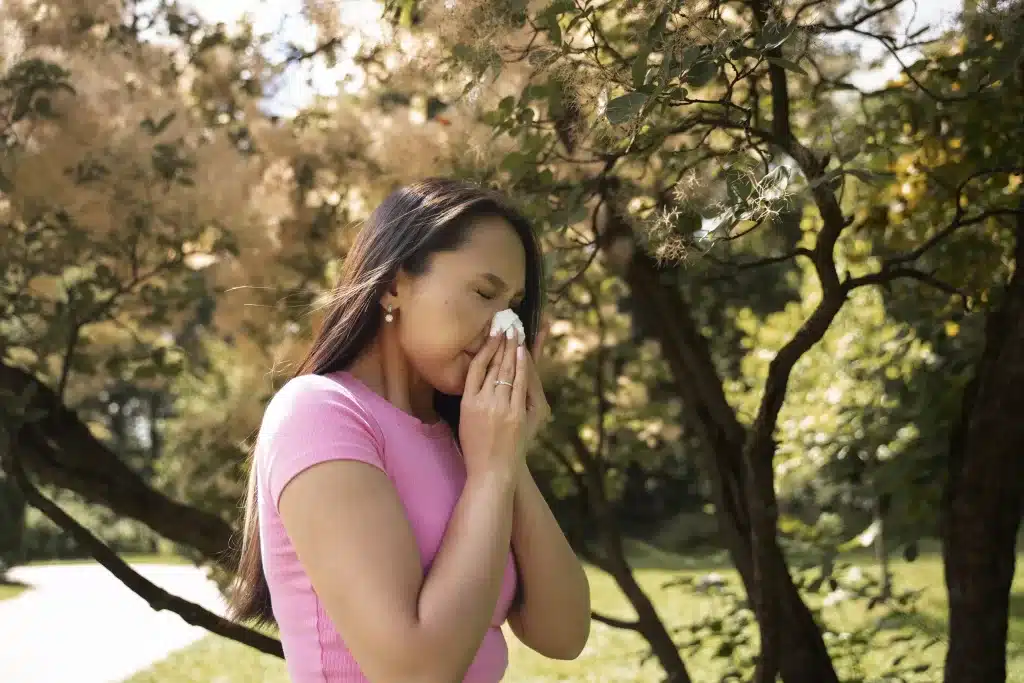Dry Eyes, Eye Care, Eye Care How To, Eye Safety
Understanding Allergies and Eye Health
Allergies can upset more than just your nose—they also take a toll on your eyes. Have you noticed itchy, red, or watery eyes during certain times of the year? If so, you might be facing eye allergies.
This blog looks at eye allergies. It explains what they are and what causes them. It also discusses common triggers. Additionally, it shows how seasonal and dry eyes relate to your vision care.
Let’s explore the ins and outs of eye allergies and how to care for your eye health during challenging allergy seasons.
What Are Eye Allergies?
Eye allergies, or allergic conjunctivitis, occur when your eyes react to environmental allergens like pollen or dust. Unlike infections, which are caused by bacteria or viruses, eye allergies result from an overreaction of your immune system.
When you come into contact with allergens, your body releases a chemical called histamine. This causes symptoms like redness, itching, and swelling in your eyes. These symptoms can occur alongside other allergy-related issues, like sneezing and nasal congestion.
The interesting part? Eye allergies, such as pink eye or other eye infections, don’t spread from person to person. They’re not contagious but can still be bothersome—even painful.
Key Symptoms of Eye Allergies
Recognizing the signs of eye allergies is crucial for managing them effectively. Common symptoms include:
- Persistent itching
- Redness in or around the eyes
- Watery or excessive tearing
- Swelling of eyelids
- Burning or stinging sensation
If you’re experiencing one or more of these symptoms, allergens are likely the underlying cause.
Common Allergens That Affect Your Eyes
Understanding “what triggers eye allergies” can help prevent them. Here are some common culprits behind eye allergies:
Pollen
Seasonal pollen from trees, grasses, and weeds is among the most significant causes of eye allergies. These microscopic particles enter your eyes, triggering an allergic reaction, especially during spring when pollen is abundant.
Dust Mites
Dust mites are found in mattresses, carpets, and furniture and produce allergens that can irritate your eyes. Their impact is often amplified in indoor environments with poor ventilation.
Pet Dander
Proteins from your pet’s skin flakes or saliva can cause allergic reactions, especially when you’re spending more time indoors with them.
Mold Spores
Mold thrives in damp or humid conditions, releasing spores into the air that often cause eye allergy symptoms.
Smoke and Air Pollution
Smoke from cigarettes, wildfires, or polluted air can irritate sensitive eyes, exacerbating symptoms for allergy sufferers.
Preventive measures like air purifiers and minimizing exposure to these allergens can help reduce irritation.
For detailed allergy tips and solutions, visit Spring Allergies and Your Eyes.

How Seasonal Allergies Impact Your Vision
Spring might be vibrant, but it’s also synonymous with allergy season for many. “Seasonal allergy eye issues” are a growing concern because of higher pollen levels and longer exposure times outdoors. Let’s understand the connection between allergies and their impact on vision.
Histamine and Eye Symptoms
When allergens like pollen or pet dander come into contact with your eyes, histamines are released. While this defense mechanism protects you, it causes redness, itching, and watery eyes as side effects.
Blurry Vision Risks
Severe allergic reactions can cause temporary blurry vision. Swelling and excessive tearing interfere with your eyesight, making everyday tasks like driving or reading uncomfortable.
Allergies Weaken Tear Films
Allergens disrupt the natural tear film coating your eyes, causing soreness and irritation. Protective eyewear, like wrap-around sunglasses and artificial tears, can provide much-needed relief.
Learn more about allergy-related eye care at Why Spring is the Perfect Time for an Eye Exam.
The Connection Between Allergies and Dry Eyes
Many people don’t realize there’s a link between eye allergies and dry eyes. Although they seem like opposites (allergies cause watery eyes, right?), they’re interconnected.
Allergies can disrupt the balance of your tear film, that thin layer that keeps your eyes moist and comfortable. This means that even if your eyes water a lot, your tears may not be good enough to protect or soothe them.
The result? Dry, irritated eyes that exacerbate allergy symptoms.
To make matters more complicated, many allergy treatments, like antihistamines, can dry out your eyes further. This creates a frustrating cycle where treating one problem makes the other worse.
Strategies for Managing Eye Allergies
If allergies are wreaking havoc on your eyes, there are ways to take back control. Here are a few practical tips to safeguard your eye health:
Avoid Your Triggers
Try to reduce your exposure to allergens. For example, stay inside when pollen levels are high. This usually happens in the early morning and evening. Use air purifiers and keep your windows closed.
Wash your hands and face after being outdoors to prevent allergens from lingering.
Be Smart About Eye Protection
Wear sunglasses when outside to shield your eyes from pollen and other particles. If you wear contact lenses, switch to glasses when your allergies are particularly severe. Lenses can trap allergens in your eyes, worsening symptoms.
Explore Over-the-Counter Products
Artificial tears can help rinse away allergens while also soothing irritation. Look into antihistamine eye drops or oral medications to block your body’s allergic response. Just be cautious with eye drops labelled “decongestant”; prolonged use can sometimes worsen the redness.
Talk to Your Doctor
If your symptoms are severe or persistent, it might be time to consult an allergist or an eye care professional. They can guide you toward prescription treatments or allergy shots for long-term relief.
Stay Hydrated
Drinking enough water throughout the day can help maintain the moisture levels in your eyes and minimize dryness.
Explore our Allergy Kit today—designed to help you stay prepared and easily manage allergy symptoms. Available on our website!
The Link Between Allergies and Dry Eyes
Many people don’t realize there’s a link between eye allergies and dry eyes. Although they seem like opposites (allergies cause watery eyes, right?), they’re interconnected.
Allergies can disrupt the balance of your tear film, that thin layer that keeps your eyes moist and comfortable. This means that even if your eyes water a lot, your tears may not be good enough to protect or soothe them.
The result? Dry, irritated eyes that exacerbate allergy symptoms.
To make matters more complicated, many allergy treatments, like antihistamines, can dry out your eyes further. This creates a frustrating cycle where treating one problem makes the other worse.
How Dry Eyes Worsen Allergies
When eyes become dry, they are even more sensitive to allergens, creating a vicious cycle of irritation. Dry eyes worsen allergy symptoms like redness, itching, and swelling, especially if you don’t address the discomfort promptly.
Managing Dry Eye Symptoms
Here are some quick solutions to alleviate dry eyes and allergies:
- Use preservative-free artificial tears like I-Drop Pur Gel. This product offers long-lasting hydration and relief for dry eyes caused by allergies.
- Consider Omega-3 supplements like DE3 Dry Eye Omega 3 Capsules, which research supports as beneficial for maintaining better tear health.
- Try warm compresses or eyelid wipes like I-LID’ N LASH® Plus Wipes to reduce allergen buildup around your eyes.
For more personalized recommendations, check out Top Dry Eye Solutions by MyPear.ca.
Take Charge of Your Eye Health Today
Understanding “eye allergies causes” and identifying your triggers is the first step toward relief. Combine prevention strategies with effective treatments to improve both immediate symptoms and long-term eye health. You can protect your vision in many ways. Limit outdoor time on days with high allergens. Use high-quality allergy eye drops.
It might also be time to book an eye exam to address persistent symptoms, especially during heavy allergy seasons. A quick visit to your optometrist can provide professional advice and solutions tailored to your needs.
Remember, keeping your eyes healthy is not just about handling allergies when they happen. It’s also about taking steps to prevent symptoms before they start. With the right approach, your eyes can stay clear, comfortable, and ready for anything life throws your way—even a little pollen.
This content has been reviewed by Optometrist Dr. Davinder Sidhu.



